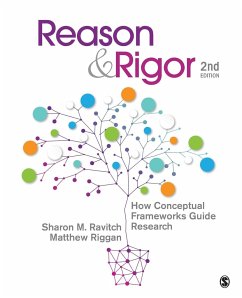- Broschiertes Buch
- Merkliste
- Auf die Merkliste
- Bewerten Bewerten
- Teilen
- Produkt teilen
- Produkterinnerung
- Produkterinnerung
Designed for novice as well as more experienced researchers, Reason & Rigor presents conceptual frameworks as a mechanism for aligning literature review, research design, and methodology. The book explores the conceptual framework defined as both a process and a product that helps to direct and ground researchers as they work through common research challenges. Focusing on published studies on a range of topics and employing both quantitative and qualitative methods, the updated Second Edition features two new chapters and clearly communicates the processes of developing and defining conceptual frameworks.…mehr
Andere Kunden interessierten sich auch für
![The Verdict of Reason The Verdict of Reason]() Henry M. DexterThe Verdict of Reason17,90 €
Henry M. DexterThe Verdict of Reason17,90 €![Morning Hours Morning Hours]() Moses MendelssohnMorning Hours100,99 €
Moses MendelssohnMorning Hours100,99 €![Essays on the Theory of Scientific Cognition Essays on the Theory of Scientific Cognition]() Jerzy KmitaEssays on the Theory of Scientific Cognition41,99 €
Jerzy KmitaEssays on the Theory of Scientific Cognition41,99 €![Beyond Faith and Reason Beyond Faith and Reason]() Tim HolmesBeyond Faith and Reason28,99 €
Tim HolmesBeyond Faith and Reason28,99 €![Reason and revelation Reason and revelation]() Robert MilliganReason and revelation30,90 €
Robert MilliganReason and revelation30,90 €![Qualitative Research Qualitative Research]() Sharon M. RavitchQualitative Research81,99 €
Sharon M. RavitchQualitative Research81,99 €![The SAGE Handbook of Qualitative Research The SAGE Handbook of Qualitative Research]() Norman K. DenzinThe SAGE Handbook of Qualitative Research139,99 €
Norman K. DenzinThe SAGE Handbook of Qualitative Research139,99 €-
-
-
Designed for novice as well as more experienced researchers, Reason & Rigor presents conceptual frameworks as a mechanism for aligning literature review, research design, and methodology. The book explores the conceptual framework defined as both a process and a product that helps to direct and ground researchers as they work through common research challenges. Focusing on published studies on a range of topics and employing both quantitative and qualitative methods, the updated Second Edition features two new chapters and clearly communicates the processes of developing and defining conceptual frameworks.
Produktdetails
- Produktdetails
- Verlag: SAGE Publications, Inc / Sage Publications
- 2. Aufl.
- Seitenzahl: 264
- Erscheinungstermin: 21. Januar 2016
- Englisch
- Abmessung: 235mm x 191mm x 14mm
- Gewicht: 485g
- ISBN-13: 9781483340401
- ISBN-10: 1483340406
- Artikelnr.: 43552938
- Herstellerkennzeichnung
- Libri GmbH
- Europaallee 1
- 36244 Bad Hersfeld
- gpsr@libri.de
- Verlag: SAGE Publications, Inc / Sage Publications
- 2. Aufl.
- Seitenzahl: 264
- Erscheinungstermin: 21. Januar 2016
- Englisch
- Abmessung: 235mm x 191mm x 14mm
- Gewicht: 485g
- ISBN-13: 9781483340401
- ISBN-10: 1483340406
- Artikelnr.: 43552938
- Herstellerkennzeichnung
- Libri GmbH
- Europaallee 1
- 36244 Bad Hersfeld
- gpsr@libri.de
Sharon M. Ravitch is a professor of practice at the University of Pennsylvania's Graduate School of Education. She engages in numerous applied research projects in India, serving as a visiting scholar at the Tata Institute of Social Sciences (TISS) in Mumbai and working as a co-researcher and key resource expert in policy advocacy, professional development, and community-based participatory research related to corporate social responsibility through TISS's corporate social responsibility hub. She is involved in the design and implementation of assessment and evaluation of statewide performance through mixed-methods research in the Ministry of Human Resource Development's major policy initiative, Rashtriya Uchchatar Shiksha Abhiyan (RUSA), a countrywide reform initiative aimed to resurrect India's state public university system. Ravitch is also an expert adviser at the Center for Academic Leadership and Education Management at TISS. The center provides professional development and policy advocacy support to school education leaders across India. Ravitch works in the center's capacity-building program to collaboratively develop case studies and technology-innovation frameworks for the higher education and K-12 sectors using a participatory approach. She received the prestigious GIAN Scholar Award from the government of India for 2016-2017 and the RUSA Scholar Award for 2017-2018. Ravitch also received a Fulbright Fellowship to engage in research and applied development work in India from 2017 to 2019. Ravitch has published five books: Applied Research for Sustainable Change: A Guide for Education Leaders (with Nicole Carl, 2019); Qualitative Research: Bridging the Conceptual, Theoretical, and Methodological (2nd ed., with Nicole Carl, 2020); Reason and Rigor: How Conceptual Frameworks Guide Research (2012; 2nd ed., with Matthew Riggan, 2016); School Counseling Principles: Diversity and Multiculturalism (2006); and Matters of Interpretation: Reciprocal Transformation in Therapeutic and Developmental Relationships With Youth (with Michael Nakkula, 1998).
Chapter 1: Introduction to Conceptual Frameworks
Conceptual Frameworks Explored and Defined
Elements of a Conceptual Framework
Organization of this Book
Concluding Thoughts: Using Conceptual Frameworks
Chapter 2: Why Conceptual Frameworks?
What (and Where) is Theory?
Whose Theory is It, and Where Does It Come From?
What is a Literature Review, and What is It For?
The Case for Conceptual Frameworks: Concluding Thoughts
Chapter 3: Origins of a Conceptual Framework: The Birth of Grit
Background and context: An overview of the work in focus
The argument
Origins: Conversations with the dead and the living
Formulating the concept: From conversing to inquiring
Forming and advancing the argument
Chapter 4: Excavating Questions
"Excavating" Research Questions
About the Author
Background and Context: An Overview of the Work in Focus
The Argument
Conceptual Frameworks and Research Design
The Co-evolution of Conceptual Frameworks and Research Design
Conceptual Frameworks and Research Design: Concluding Thoughts
Reflection Questions
Chapter 5: The Role of the Conceptual Framework in Data Collection and Fieldwork
Who You Are, How You Think, and What You Study
About the Author
Background and Context: An Overview of the Work in Focus
The Argument
Hyphenated Selves as a Theoretical Framework
The Hyphen as Method: Positionality and Practice
Conceptual Frameworks and Fieldwork: Concluding Thoughts
Chapter 6: Conceptual Frameworks and the Analysis of Data
Examining the Influence of an Ever-Emerging Conceptual Framework
About the Author
Background and Context: An Overview of the Work in Focus
The Argument
From Argument to Analysis
Transcription as Data Analysis
Evolving and Shifting Frameworks of Analysis
Conceptual Frameworks and Data Analysis: Concluding Thoughts
Chapter 7: Expanding the Conversation, Extending the Argument: The Role of Conceptual Frameworks in Presenting, Explaining, and Contextualizing Findings
About the Author
Background and Context: AN OVERVIEW OF THE WORK IN FOCUS
Being in Conversation With Theory: Influences on Thought and Action
The Argument
Conclusion
Chapter 8: Reflections on the Making and Re-making of a Conceptual Framework - William K. Dunworth
Developing a Conceptual Framework
Challenges in the field
Revisiting Conceptual Frameworks: Turning Artifacts into Processes
"Everything is data": Returning to the field
Revising the conceptual framework and integrating findings
Chapter 9: The Conceptual Framework as Guide and Ballast
Developing a Conceptual Framework
Starting Points: Self and Audience
Making-and Breaking-Your Plans
The Conversation: From Listening to Speaking
Strategies and Exercises for Developing Conceptual Frameworks
Identifying Your Interests, Beliefs, and Motivations for Doing Research
Examination of the "Conversations Already Happening"
Ongoing Questions and Concerns about the Research
Concept Maps
Research Memos
Research Journal
Reason and Rigor
Conceptual Frameworks Explored and Defined
Elements of a Conceptual Framework
Organization of this Book
Concluding Thoughts: Using Conceptual Frameworks
Chapter 2: Why Conceptual Frameworks?
What (and Where) is Theory?
Whose Theory is It, and Where Does It Come From?
What is a Literature Review, and What is It For?
The Case for Conceptual Frameworks: Concluding Thoughts
Chapter 3: Origins of a Conceptual Framework: The Birth of Grit
Background and context: An overview of the work in focus
The argument
Origins: Conversations with the dead and the living
Formulating the concept: From conversing to inquiring
Forming and advancing the argument
Chapter 4: Excavating Questions
"Excavating" Research Questions
About the Author
Background and Context: An Overview of the Work in Focus
The Argument
Conceptual Frameworks and Research Design
The Co-evolution of Conceptual Frameworks and Research Design
Conceptual Frameworks and Research Design: Concluding Thoughts
Reflection Questions
Chapter 5: The Role of the Conceptual Framework in Data Collection and Fieldwork
Who You Are, How You Think, and What You Study
About the Author
Background and Context: An Overview of the Work in Focus
The Argument
Hyphenated Selves as a Theoretical Framework
The Hyphen as Method: Positionality and Practice
Conceptual Frameworks and Fieldwork: Concluding Thoughts
Chapter 6: Conceptual Frameworks and the Analysis of Data
Examining the Influence of an Ever-Emerging Conceptual Framework
About the Author
Background and Context: An Overview of the Work in Focus
The Argument
From Argument to Analysis
Transcription as Data Analysis
Evolving and Shifting Frameworks of Analysis
Conceptual Frameworks and Data Analysis: Concluding Thoughts
Chapter 7: Expanding the Conversation, Extending the Argument: The Role of Conceptual Frameworks in Presenting, Explaining, and Contextualizing Findings
About the Author
Background and Context: AN OVERVIEW OF THE WORK IN FOCUS
Being in Conversation With Theory: Influences on Thought and Action
The Argument
Conclusion
Chapter 8: Reflections on the Making and Re-making of a Conceptual Framework - William K. Dunworth
Developing a Conceptual Framework
Challenges in the field
Revisiting Conceptual Frameworks: Turning Artifacts into Processes
"Everything is data": Returning to the field
Revising the conceptual framework and integrating findings
Chapter 9: The Conceptual Framework as Guide and Ballast
Developing a Conceptual Framework
Starting Points: Self and Audience
Making-and Breaking-Your Plans
The Conversation: From Listening to Speaking
Strategies and Exercises for Developing Conceptual Frameworks
Identifying Your Interests, Beliefs, and Motivations for Doing Research
Examination of the "Conversations Already Happening"
Ongoing Questions and Concerns about the Research
Concept Maps
Research Memos
Research Journal
Reason and Rigor
Chapter 1: Introduction to Conceptual Frameworks
Conceptual Frameworks Explored and Defined
Elements of a Conceptual Framework
Organization of this Book
Concluding Thoughts: Using Conceptual Frameworks
Chapter 2: Why Conceptual Frameworks?
What (and Where) is Theory?
Whose Theory is It, and Where Does It Come From?
What is a Literature Review, and What is It For?
The Case for Conceptual Frameworks: Concluding Thoughts
Chapter 3: Origins of a Conceptual Framework: The Birth of Grit
Background and context: An overview of the work in focus
The argument
Origins: Conversations with the dead and the living
Formulating the concept: From conversing to inquiring
Forming and advancing the argument
Chapter 4: Excavating Questions
"Excavating" Research Questions
About the Author
Background and Context: An Overview of the Work in Focus
The Argument
Conceptual Frameworks and Research Design
The Co-evolution of Conceptual Frameworks and Research Design
Conceptual Frameworks and Research Design: Concluding Thoughts
Reflection Questions
Chapter 5: The Role of the Conceptual Framework in Data Collection and Fieldwork
Who You Are, How You Think, and What You Study
About the Author
Background and Context: An Overview of the Work in Focus
The Argument
Hyphenated Selves as a Theoretical Framework
The Hyphen as Method: Positionality and Practice
Conceptual Frameworks and Fieldwork: Concluding Thoughts
Chapter 6: Conceptual Frameworks and the Analysis of Data
Examining the Influence of an Ever-Emerging Conceptual Framework
About the Author
Background and Context: An Overview of the Work in Focus
The Argument
From Argument to Analysis
Transcription as Data Analysis
Evolving and Shifting Frameworks of Analysis
Conceptual Frameworks and Data Analysis: Concluding Thoughts
Chapter 7: Expanding the Conversation, Extending the Argument: The Role of Conceptual Frameworks in Presenting, Explaining, and Contextualizing Findings
About the Author
Background and Context: AN OVERVIEW OF THE WORK IN FOCUS
Being in Conversation With Theory: Influences on Thought and Action
The Argument
Conclusion
Chapter 8: Reflections on the Making and Re-making of a Conceptual Framework - William K. Dunworth
Developing a Conceptual Framework
Challenges in the field
Revisiting Conceptual Frameworks: Turning Artifacts into Processes
"Everything is data": Returning to the field
Revising the conceptual framework and integrating findings
Chapter 9: The Conceptual Framework as Guide and Ballast
Developing a Conceptual Framework
Starting Points: Self and Audience
Making-and Breaking-Your Plans
The Conversation: From Listening to Speaking
Strategies and Exercises for Developing Conceptual Frameworks
Identifying Your Interests, Beliefs, and Motivations for Doing Research
Examination of the "Conversations Already Happening"
Ongoing Questions and Concerns about the Research
Concept Maps
Research Memos
Research Journal
Reason and Rigor
Conceptual Frameworks Explored and Defined
Elements of a Conceptual Framework
Organization of this Book
Concluding Thoughts: Using Conceptual Frameworks
Chapter 2: Why Conceptual Frameworks?
What (and Where) is Theory?
Whose Theory is It, and Where Does It Come From?
What is a Literature Review, and What is It For?
The Case for Conceptual Frameworks: Concluding Thoughts
Chapter 3: Origins of a Conceptual Framework: The Birth of Grit
Background and context: An overview of the work in focus
The argument
Origins: Conversations with the dead and the living
Formulating the concept: From conversing to inquiring
Forming and advancing the argument
Chapter 4: Excavating Questions
"Excavating" Research Questions
About the Author
Background and Context: An Overview of the Work in Focus
The Argument
Conceptual Frameworks and Research Design
The Co-evolution of Conceptual Frameworks and Research Design
Conceptual Frameworks and Research Design: Concluding Thoughts
Reflection Questions
Chapter 5: The Role of the Conceptual Framework in Data Collection and Fieldwork
Who You Are, How You Think, and What You Study
About the Author
Background and Context: An Overview of the Work in Focus
The Argument
Hyphenated Selves as a Theoretical Framework
The Hyphen as Method: Positionality and Practice
Conceptual Frameworks and Fieldwork: Concluding Thoughts
Chapter 6: Conceptual Frameworks and the Analysis of Data
Examining the Influence of an Ever-Emerging Conceptual Framework
About the Author
Background and Context: An Overview of the Work in Focus
The Argument
From Argument to Analysis
Transcription as Data Analysis
Evolving and Shifting Frameworks of Analysis
Conceptual Frameworks and Data Analysis: Concluding Thoughts
Chapter 7: Expanding the Conversation, Extending the Argument: The Role of Conceptual Frameworks in Presenting, Explaining, and Contextualizing Findings
About the Author
Background and Context: AN OVERVIEW OF THE WORK IN FOCUS
Being in Conversation With Theory: Influences on Thought and Action
The Argument
Conclusion
Chapter 8: Reflections on the Making and Re-making of a Conceptual Framework - William K. Dunworth
Developing a Conceptual Framework
Challenges in the field
Revisiting Conceptual Frameworks: Turning Artifacts into Processes
"Everything is data": Returning to the field
Revising the conceptual framework and integrating findings
Chapter 9: The Conceptual Framework as Guide and Ballast
Developing a Conceptual Framework
Starting Points: Self and Audience
Making-and Breaking-Your Plans
The Conversation: From Listening to Speaking
Strategies and Exercises for Developing Conceptual Frameworks
Identifying Your Interests, Beliefs, and Motivations for Doing Research
Examination of the "Conversations Already Happening"
Ongoing Questions and Concerns about the Research
Concept Maps
Research Memos
Research Journal
Reason and Rigor








